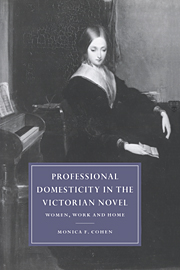Book contents
- Frontmatter
- Contents
- Acknowledgments
- Introduction
- 1 Persuading the navy home: Austen and professional domesticism
- 2 Homesick: the domestic interiors of Villette
- 3 Dickens I: Great Expectations and vocational domesticity
- 4 Dickens II: Little Dorrit in a home: institutionalization and form
- 5 Professing renunciation: domesticity in Felix Holt
- 6 A prejudice for milk: professionalism, nationalism and domesticism in Daniel Deronda
- Afterword
- Notes
- Selected bibliography
- Index
- CAMBRIDGE STUDIES IN NINETEENTH-CENTURY LITERATURE AND CULTURE
2 - Homesick: the domestic interiors of Villette
Published online by Cambridge University Press: 10 November 2009
- Frontmatter
- Contents
- Acknowledgments
- Introduction
- 1 Persuading the navy home: Austen and professional domesticism
- 2 Homesick: the domestic interiors of Villette
- 3 Dickens I: Great Expectations and vocational domesticity
- 4 Dickens II: Little Dorrit in a home: institutionalization and form
- 5 Professing renunciation: domesticity in Felix Holt
- 6 A prejudice for milk: professionalism, nationalism and domesticism in Daniel Deronda
- Afterword
- Notes
- Selected bibliography
- Index
- CAMBRIDGE STUDIES IN NINETEENTH-CENTURY LITERATURE AND CULTURE
Summary
NONPERSONAL SOCIABILITY
With romance and marriage relegated to the Polly Home subplot, Villette's unattractive and acerbic heroine unhappily resigns herself to a solitary life – a life spent out of wedlock, a homeless life:
But, afterwards, is there nothing more for me in life – no true home – nothing to be dearer to me than myself and by its paramount preciousness, to draw from me better things than I care to culture for myself only? Nothing at whose feet I can willingly lay down the whole burden of human egotism, and gloriously take up the nobler charge of labouring and living for others? I suppose, Lucy Snowe, the orb of your life is not to be so rounded; for you the crescent phase must suffice.
By threatening Lucy Snowe with spinsterhood, Villette displays here a peculiar rhetoric of renunciation. The moment records Lucy's decision to redirect her desires: instead of wishing for a “true home” of her own, she will wish for a school of her own; instead of wanting to establish herself in the institution of marriage, she will construct a surrogate establishment. Despite the passage's subtext of desire, Lucy's paean to home does not represent marriage as a pleasure, or as a means of emotional gratification or even as a personal or private relationship shared with one other person; on the contrary, Lucy presents the institution of marriage as a noble and ennobling space, a “rounded” place populated by anonymous “others” for whom she would have laboured and lived selflessly.
- Type
- Chapter
- Information
- Professional Domesticity in the Victorian NovelWomen, Work and Home, pp. 44 - 69Publisher: Cambridge University PressPrint publication year: 1998
- 1
- Cited by



